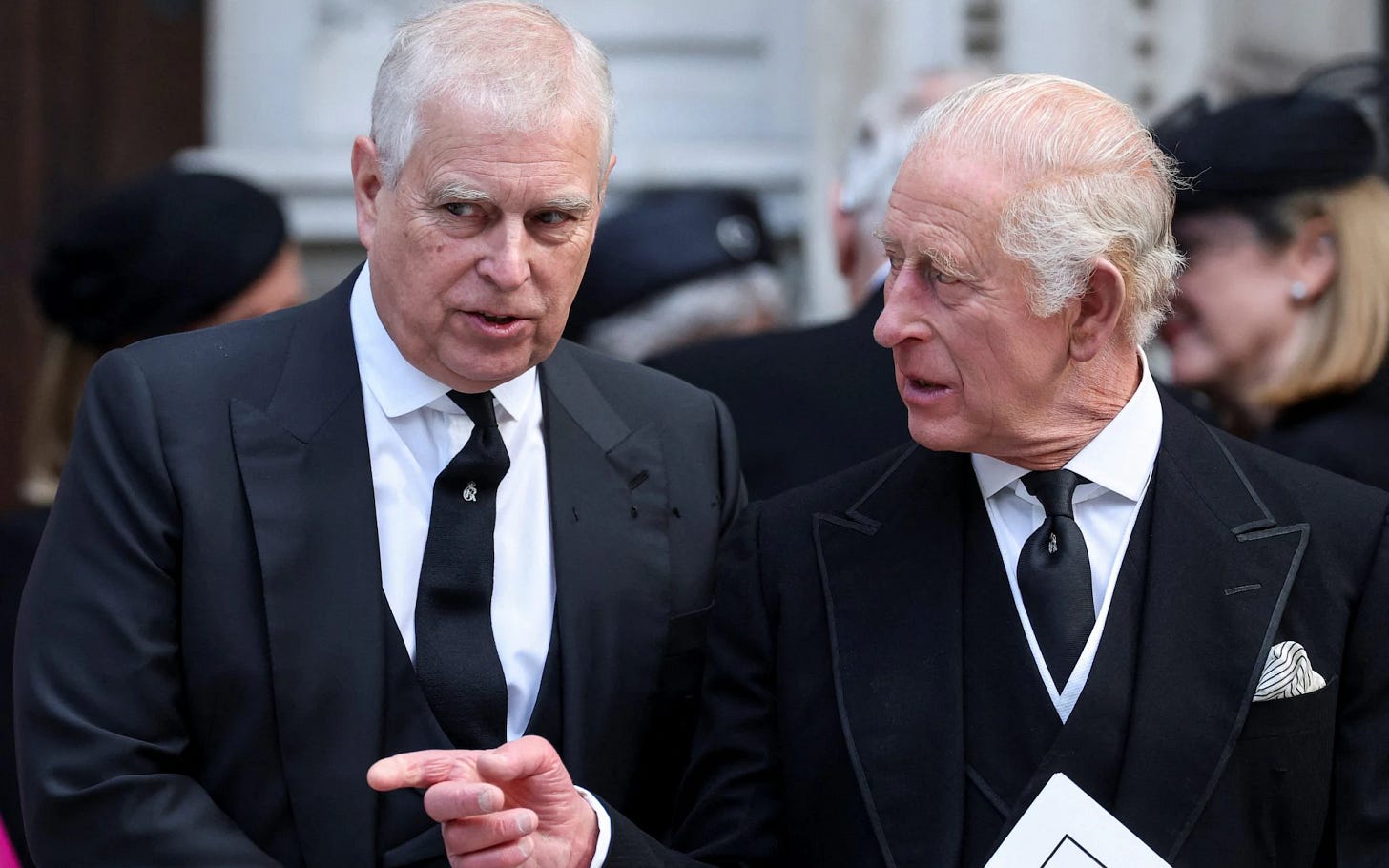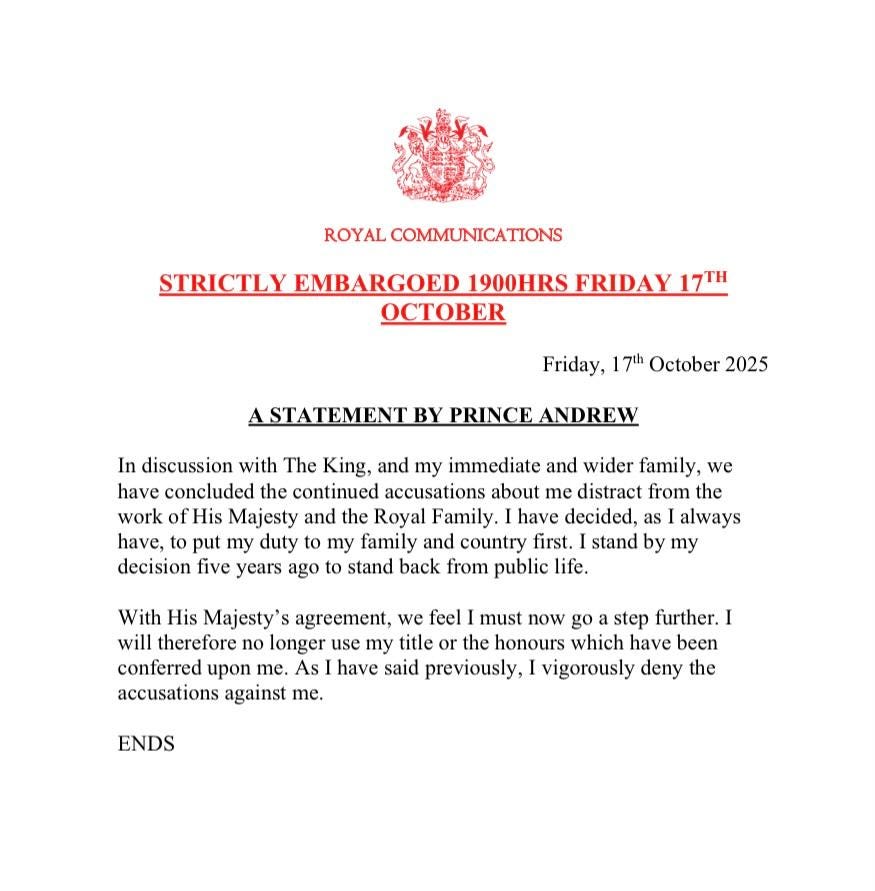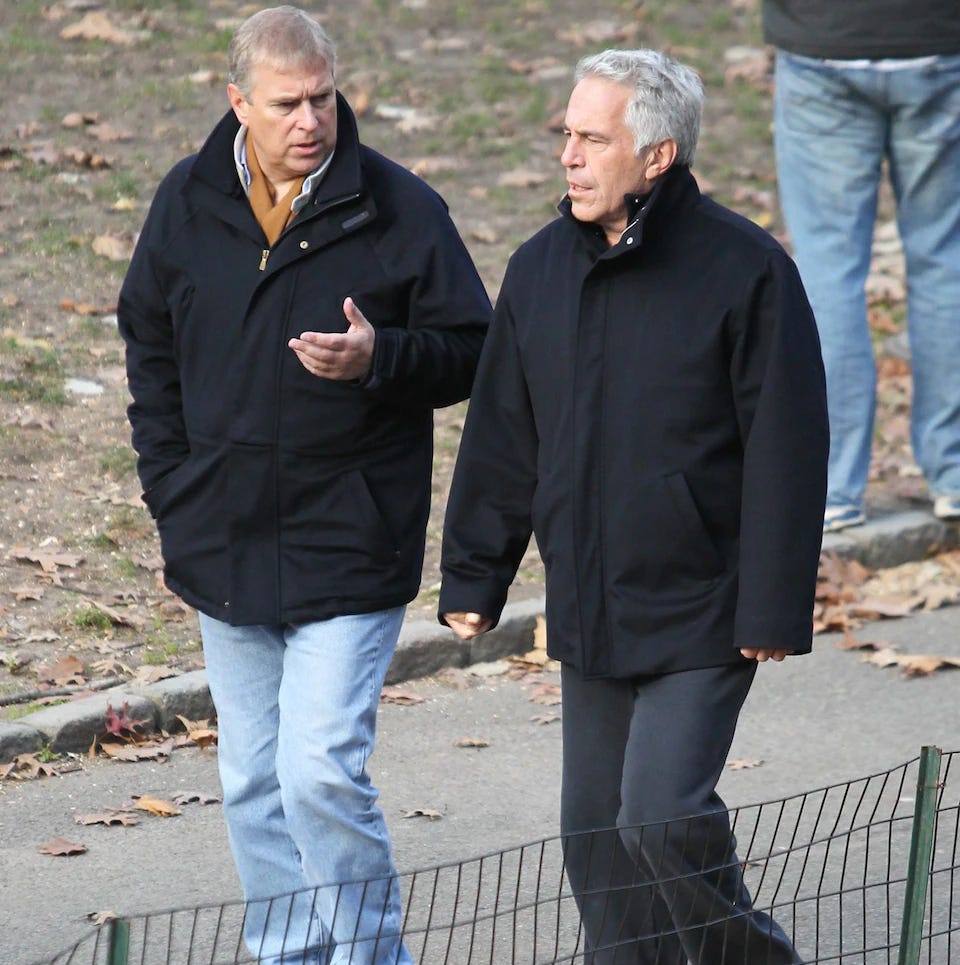How the King’s younger brother squandered his privileged position and was forced to renounce his York Dukedom and Garter Knighthood
The words were as stark as they were freighted with historic significance. Sixty-five-year-old Prince Andrew, at one time second in line to the British throne, announced that he was relinquishing the Duke of York title given him by his late mother, Queen Elizabeth II, nearly forty years ago. Along with it, he surrendered his position as a Royal Knight Companion in the Most Noble Order of the Garter—Britain’s most ancient order of chivalry—that he had held since 2006, as well as his status as Knight Grand Cross of the Royal Victorian Order, a gift from his mother in 2011.
For some additional perspective on his fall from grace, I hope you’ll read two of my Royals Extras that explain why the Duke of York title is important and describe the history of Royal Lodge, the 30-room mansion near Windsor Castle that Andrew has been unwilling to leave: What to do about Prince Andrew? (December 22, 2024) and The Colorful History of Royal Lodge(May 21, 2023)
His notorious friendship
Since the creation of the Duke of York designation in 1385, thirteen royal princes have held the title, typically second sons of the monarch. Five of the dukes later ascended to the throne, including Andrew’s great-grandfather, King George V, and his grandfather, King George VI. Andrew dishonored his dukedom with a series of scandals, most notably his notorious friendship with the convicted pedophile Jeffrey Epstein. Virginia Roberts Giuffre, an employee of Epstein, alleged that she was forced by him to have sex with Andrew on three occasions when she was only seventeen. Andrew has consistently denied Giuffre’s allegations, but in 2022 he settled out of court by paying her £12 million to end her lawsuit against him. The prince was also linked to officials in the Chinese Communist Party involved in ongoing spy scandals and was criticized for using his royal position to secure questionable business deals with shady international figures.
Over the past fifteen years, one revelation after another about Andrew’s behavior has tarnished his name and the reputation of the royal family. His friendship with Epstein began in 1999, and their time together remained largely a private matter until February 2011 with the publication of a photograph of the two men walking in Manhattan’s Central Park. A week later newspapers published a picture of forty-one-year-old Andrew with seventeen-year-old Giuffre in 2001. Epstein had been convicted in 2008 of having unlawful sex with a minor and imprisoned for more than a year. After his release, Andrew visited him in New York in December 2010 when the Central Park photo was taken. Andrew later explained that the trip was meant to end his friendship with Epstein in a face-to-face “honourable” way.
A disastrous interview
Additional allegations about the prince mingling his private business interests with his activities as the UK’s special representative for trade and investment forced him to give up that role in July 2011. Four years later, Giuffre went public with charges of sexual abuse by Andrew in a lawsuit she filed against Epstein for sexual trafficking. In the summer of 2019 Epstein was charged with federal sex trafficking and weeks later died in his jail cell, an apparent suicide. That November Andrew sat for a disastrous interview on the BBC’s Newsnight program in which he failed to effectively rebut Giuffre’s charges and seemed oblivious to the damage done to Epstein’s victims.
Days later, Andrew was forced to step back from his royal duties, and he expressed regret for his friendship with Epstein. Unmollified, Giuffre sued him for sexual assault in August 2021. Under orders from the Queen in January 2022, he relinquished a dozen military titles and 230 royal patronages and stopped using the honorific “His Royal Highness.” A month later he settled Giuffre’s lawsuit with significant financial assistance from the Queen and Prince Charles. Andrew’s association with Yang Tengbo, a suspected Chinese spy, came to light in December 2024.
“We’ll play some more soon!!!”
The two strands of scandal converged this fall. First was the disclosure in September of an email to Epstein from Andrew’s ex-wife Sarah—still the Duchess of York. Writing in April 2011, she called him a “steadfast, generous and supreme friend” only weeks after publicly denouncing him and vowing to “have nothing ever to do with Jeffrey Epstein ever again.” Within days, more than a half dozen charities cut ties with her.
This month came the publication of a devastating email from Andrew to Epstein in February 2011—two months after the prince had claimed to have ended their friendship. Andrew expressed support for the disgraced sexual predator, writing, “We are in this together…Keep in close touch and we’ll play some more soon!!!” His words exposed the lie he had told his family as well as the public in his BBC Newsnight interview.
Almost simultaneously, it emerged that Andrew had met at least three times—including a lunch at Buckingham Palace—in 2018 and 2019 with Cai Qi, a senior Chinese official suspected of spying on the British government. Although Andrew was not accused of wrongdoing, the murky association brought yet another surge of unwelcome headlines for the royal family.

The potentially humiliating alternative
The disclosures prompted King Charles to initiate a tough discussion with Andrew that led to the prince’s surprise surrender of his most coveted titles. The potentially humiliating alternative would have been stripping him of his royal peerage through an Act of Parliament. Andrew’s back was to the wall, and he had only one escape. His former wife reverted to Sarah Ferguson, although by way of compromise, the King allowed their two daughters, Beatrice and Eugenie, to retain their princess titles. As a son of Queen Elizabeth II, Andrew kept the title of prince as his birthright. For the time being, he is also holding onto Royal Lodge, which the King has been pressing him to vacate for a more modest residence.
While researching my books on Princess Diana, Queen Elizabeth II, and Prince Charles, I discovered a range of opinions about Andrew. Some people gave him credit for hard work and loyalty, but most were dismayed by the arrogance, greed, and sense of privilege that fueled his downfall. He had been living on the edge of propriety from an early age, but I wondered what forces amplified the defects in his character.








Follow